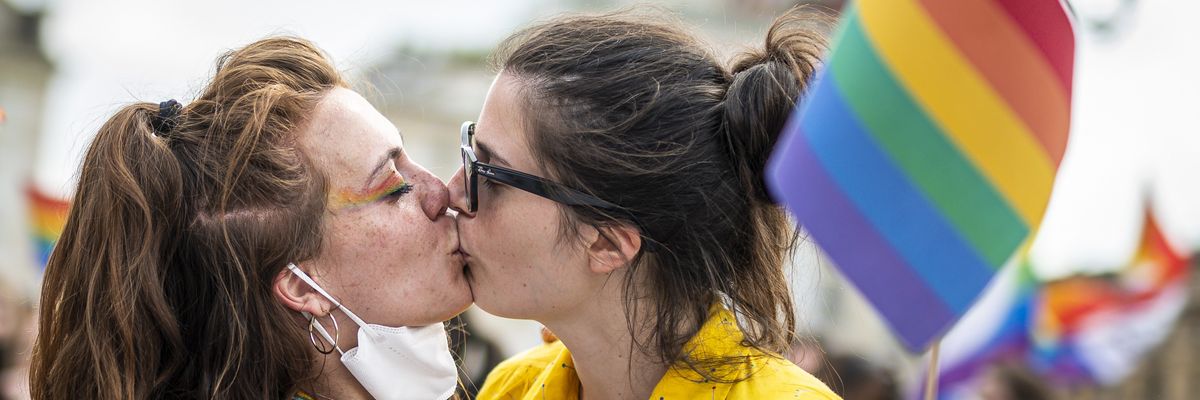A first-of-its-kind Human Rights Watch report
published Tuesday exposes the discrimination and violence that lesbian, bisexual, and queer women and nonbinary people face in over two dozen countries around the world.
Human Rights Watch (HRW) researcher Erin Kilbride interviewed 66 members of the lesbian, bisexual, and queer (LBQ+) community over the past year for her 211-page publication—which, she stressed during a call with journalists, is trans-inclusive.
The report, entitled
"This Is Why We Became Activists": Violence Against Lesbian, Bisexual, and Queer Women and Nonbinary People, looks "beyond the criminalization of same-sex conduct," Kilbride explained.
The document details violence that LBQ+ people endure from family members, security forces, and others, as well as discrimination, particularly related to employment; healthcare—especially fertility services; housing, land, and property rights; justice systems; and migration.
"The scale of brutal violence, legal discrimination, and sexualized harassment these communities face is rarely documented."
Kilbride and others on the call highlighted that while the discrimination and violence are often "highly visible," they are also "historically underdocumented," including by major human rights groups. The researcher expressed hope that the new report is "a step in the right direction" to fill that "immense gap."
"Lesbian, bisexual, and queer women are renowned for leading human rights struggles around the world," Kilbride said in a statement. "But the scale of brutal violence, legal discrimination, and sexualized harassment these communities face is rarely documented."
The interviewees ranged in age from 21 to 75 and the majority of them are "movement leaders, activists, and human rights defenders working at the local or national level," the report notes. They include Amani, who told HRW that "I got beaten by police in a protest for an arrested human rights defender Rania Amdouni in 2021."
According to the report:
Amani is a 27-year-old Lebanese-Tunisian lesbian activist, queer feminist, and woman human rights defender in Tunisia. She leads writing therapy workshops for people who have experienced trauma, human rights violations, and discrimination and for members of the queer community who have depression.
In 2021, police physically assaulted Amani. One of her ribs was broken, and she spent three days in the hospital.
[...]
Since the attack, the police have followed and stopped her three times on the street; each time, she was taken to a police station for questioning. She told Human Rights Watch that because she is a woman, the police have an "easy way" to harass her by asking if she ran away from home and if her family is looking for her, which is a gendered line of questioning that speaks to women's lack of freedom of movement and the control many families have over women... During those instances of police harassment, police often touched her short hair and arm tattoos, demanding to know why she did not present as more feminine.
"I think one queer woman's story can change those that come after it," Amani told Kilbride. "That is why I agreed to talk to you, to tell you what happened."
Andrea Rivas, a lesbian activist and lawyer in Argentina, said that "the first homophobic attack I suffered was at 12 years old: verbal violence from the father of the girl I was going with. He knew just by how I dressed. I liked pants. Parents tell girls like me if we won't stop dressing like this, we won't get to go to school. You are marginalized in the early stages, in primary school and high school."
After noting how LBQ+ people in Argentina have more limited education and employment opportunities, Rivas added that "the less economic options you have, the more exposed you are to violence. As a lawyer now, I receive so many reports that paint a picture of violence over a lifetime. We need to analyze it from the first moments, because it starts when you are little, when you are building your identity."
Along with Argentina and Tunisia, the interviewees are from Austria, Bulgaria, Canada, Egypt, El Salvador, Germany, Hungary, Indonesia, Italy, Japan, Kenya, Kyrgyzstan, Lebanon, Malawi, Mexico, Poland, Russia, Spain, Sri Lanka, Sweden, Tanzania, Uganda, Ukraine, and the United States.
Russia's ongoing invasion of Ukraine, launched nearly a year ago, has forced some Ukrainian parents to decide whether to remain in their war-torn country or flee to Poland, where they fear losing their children, the report states. LBQ+ people in other nations, such as the United States, also face various problems related to parenthood.
The report includes the story of Kris Williams and Rebekah Wilson, who divorced after Wilson gave birth to their child. Williams' lawyer, Robyn Hopkins, told HRW of the former U.S. couple's battle over the birth certificate and custody: "Mothers should not have to adopt their own children. My client and her ex-wife decided to have this child while they were married."
The publication also points out that "in the U.S., three large insurance companies cover fertility treatments for heterosexual couples who demonstrate an inability to get pregnant after a set amount of time, usually approximately a year. For LBQ+ couples, demonstrating that neither partner produces sperm is usually insufficient proof of an 'inability to get pregnant. Instead, LBQ+ couples are often asked to 'show receipt of multiple failed rounds of fertility treatments to qualify for insurance coverage,' meaning the price of proving 'inability' can be up to $30,000 higher for LBQ+ couples than for heterosexual ones."
In addition to sharing the experiences of LBQ+ people from across the globe, the report features policy recommendations for civil society, health departments, judiciaries, national legislatures, and security forces.
"LBQ+ activists are experts in the violence their communities experience," said Kilbride. "With this report, we provide governments and donors with concrete steps for action, starting with visibility, funding, and protection for LBQ+ movements."




